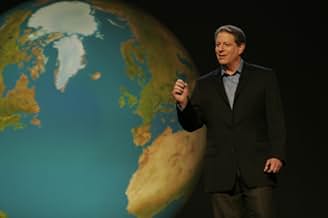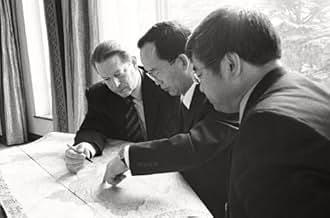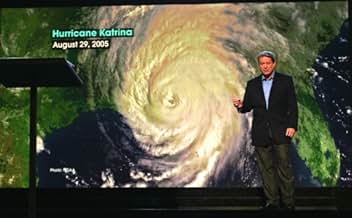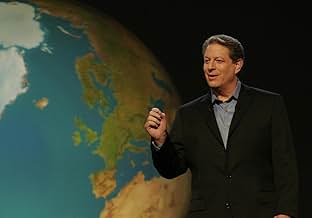NOTE IMDb
7,4/10
86 k
MA NOTE
Davis Guggenheim suit Al Gore qui fait campagne pour sensibiliser le public aux dangers du réchauffement climatique et appelle à une action immédiate pour enrayer ses effets destructeurs sur... Tout lireDavis Guggenheim suit Al Gore qui fait campagne pour sensibiliser le public aux dangers du réchauffement climatique et appelle à une action immédiate pour enrayer ses effets destructeurs sur l'environnement.Davis Guggenheim suit Al Gore qui fait campagne pour sensibiliser le public aux dangers du réchauffement climatique et appelle à une action immédiate pour enrayer ses effets destructeurs sur l'environnement.
- Réalisation
- Scénario
- Casting principal
- Récompensé par 2 Oscars
- 34 victoires et 11 nominations au total
George Bush
- Self
- (images d'archives)
- (non crédité)
George W. Bush
- Self
- (images d'archives)
- (non crédité)
Ronald Reagan
- Self
- (images d'archives)
- (non crédité)
Avis à la une
Plain and simple - all the negative comments here are from people that simply haven't seen it. See the movie before you try to disprove points that it's not trying to make. See the movie even if you think the globe is in a cooling pattern for some reason (then you can debate the evidence it lays out before you.) I for one have seen it, and it serves not as a political soapbox, but simply a filmed version of a presentation which Gore has been giving since for over 20 years - only to pick up where he left off after conceding the last election.
The film is a call to arms for us to fix a fixable problem, explaining the few things each individual can do to bring CO2 levels back down to where they were pre-1970's - On a whole - the film views a little like a college lecture, because it essentially is one. But the topic discussed is imperative.
Don't get bogged down by anyone trying to turn the film into a political issue. It's a right or wrong issue, plain and simple.
Just the facts ma'am.
The film is a call to arms for us to fix a fixable problem, explaining the few things each individual can do to bring CO2 levels back down to where they were pre-1970's - On a whole - the film views a little like a college lecture, because it essentially is one. But the topic discussed is imperative.
Don't get bogged down by anyone trying to turn the film into a political issue. It's a right or wrong issue, plain and simple.
Just the facts ma'am.
I agree with several posters: This movie would have been much more effective if it would have focused more upon the issue of global warming and less upon Al Gore continuing to cry about how Presidents are not elected via popular vote. While I only watched the movie once, I found it to be littered with self-serving political jabs that overshadowed the purported intentions of the film.
For example, Gore makes a major point regarding a Bush aide who edited an environmental report. However, early in the movie we hear a recording of New Orleans' mayor begging for help during the first days of the Katrina disaster, followed by Al Gore's voice mysteriously entering the conversation with "Please tell me what I can do to help." I suppose creating a fictitious Katrina-friendly discussion is OK as long as it continues to paint Gore as some sort of saint.
I was also unaware that the fall of Communism was a "truly bi-partisan" effort, as Mr. Gore vehemently opposed every move by the Reagan administration with regards to military escalation up to and including the Star Wars program. As we all know, these were major contributors to the Soviet Union raising the white flag that ended the Cold War.
I suppose the biggest question does not involve Mr. Gore's tireless efforts in the 70's, 80's, and over the last ten years. Instead, I wonder exactly what he did to solve this issue when he was the second most powerful man in the world. Apparently Mr. Gore had more important things to do during those eight years.
Saint Al could have done so much good with this film, but instead used it to bitch and moan about how he lost an election he should have won in a landslide. By doing this, he lost a golden opportunity to gain bipartisan support. At least it is comforting to know he used a massive motorcade to travel the eight blocks to the movie's premiere instead of following his own advice and WALKING.
Do as I say, not as I do.
For example, Gore makes a major point regarding a Bush aide who edited an environmental report. However, early in the movie we hear a recording of New Orleans' mayor begging for help during the first days of the Katrina disaster, followed by Al Gore's voice mysteriously entering the conversation with "Please tell me what I can do to help." I suppose creating a fictitious Katrina-friendly discussion is OK as long as it continues to paint Gore as some sort of saint.
I was also unaware that the fall of Communism was a "truly bi-partisan" effort, as Mr. Gore vehemently opposed every move by the Reagan administration with regards to military escalation up to and including the Star Wars program. As we all know, these were major contributors to the Soviet Union raising the white flag that ended the Cold War.
I suppose the biggest question does not involve Mr. Gore's tireless efforts in the 70's, 80's, and over the last ten years. Instead, I wonder exactly what he did to solve this issue when he was the second most powerful man in the world. Apparently Mr. Gore had more important things to do during those eight years.
Saint Al could have done so much good with this film, but instead used it to bitch and moan about how he lost an election he should have won in a landslide. By doing this, he lost a golden opportunity to gain bipartisan support. At least it is comforting to know he used a massive motorcade to travel the eight blocks to the movie's premiere instead of following his own advice and WALKING.
Do as I say, not as I do.
In the early 90's the CIA changed its charter from monitoring the Soviets to looking at all serious threats to the nation. Out of this came Project Medea, focused on climate change. Using classified intelligence much of it still classified this large project concluded absolutely that global warming was occurring and that it was an immanent threat to the nation. This was reported in public by the Director in 1996.
When Bush came to power, the project was dismantled by Cheney who as Secretary of Defense fought the establishment of Medea. The results were buried and denied and Bush went on record saying that climate change was a hoax. (Both he and McCain now admit that climate change is occurring but that we need to "be deliberate" and "cost effective" in responding. You know what that means.)
Some of the material from Medea is used in this movie: the Arctic Ice Cap thickness survey, but if Gore (who was briefed at the time) could have used that larger material, his case would have been even stronger. It is strong enough, despite a few unnecessarily dramatic photographic effects that bend the context here and there. That classified science might not have made for a cinematic presentation because much of it deals with extinction-scale pandemics.
The presentation program used here is KeyNote, Apple's competitor to Microsoft's PowerPoint. Its worth noting that it is a very snazzy product. Apparently much of the design from that period came from the wishes of Gore for this project and the demands of Steve Jobs for his own keynote speeches. Its a great story by itself.
In terms of narrative construction, there are two stories here. One is the story of the collapse of the Earth's weather system. Frankly, I think he could have done a better job on this. The science is complex but overwhelming. But it does not lend itself well to pictures or simple predictions.
To make this palatable, you need a wrapper story, a framing narrative. What's refreshing about this is that the usual choice wasn't made: to focus on the "conspiracy" of climate change deniers, a couple of outlier scientists and a passel of industry groups and ideologue political organizations. Instead, they chose to wrap the slideshow with a story of redemptive idealism about the presenter. I think it works, but it carries baggage.
About two fifths of the electorate voted against this guy, and many of those did because they preferred a different myth, a different story. That's a pretty heavy burden to overcome if what you want to do is lubricate the essential message. I had only a little trouble with it because I know how truly earnest he is. But earnestness and dedication isn't science, and facts, truth is supposed to be the issue at core.
You cannot be successful in advertising that with personal voyages and memories.
But so far as the slide show. Its definitely worth watching.
Ted's Evaluation -- 3 of 3: Worth watching.
When Bush came to power, the project was dismantled by Cheney who as Secretary of Defense fought the establishment of Medea. The results were buried and denied and Bush went on record saying that climate change was a hoax. (Both he and McCain now admit that climate change is occurring but that we need to "be deliberate" and "cost effective" in responding. You know what that means.)
Some of the material from Medea is used in this movie: the Arctic Ice Cap thickness survey, but if Gore (who was briefed at the time) could have used that larger material, his case would have been even stronger. It is strong enough, despite a few unnecessarily dramatic photographic effects that bend the context here and there. That classified science might not have made for a cinematic presentation because much of it deals with extinction-scale pandemics.
The presentation program used here is KeyNote, Apple's competitor to Microsoft's PowerPoint. Its worth noting that it is a very snazzy product. Apparently much of the design from that period came from the wishes of Gore for this project and the demands of Steve Jobs for his own keynote speeches. Its a great story by itself.
In terms of narrative construction, there are two stories here. One is the story of the collapse of the Earth's weather system. Frankly, I think he could have done a better job on this. The science is complex but overwhelming. But it does not lend itself well to pictures or simple predictions.
To make this palatable, you need a wrapper story, a framing narrative. What's refreshing about this is that the usual choice wasn't made: to focus on the "conspiracy" of climate change deniers, a couple of outlier scientists and a passel of industry groups and ideologue political organizations. Instead, they chose to wrap the slideshow with a story of redemptive idealism about the presenter. I think it works, but it carries baggage.
About two fifths of the electorate voted against this guy, and many of those did because they preferred a different myth, a different story. That's a pretty heavy burden to overcome if what you want to do is lubricate the essential message. I had only a little trouble with it because I know how truly earnest he is. But earnestness and dedication isn't science, and facts, truth is supposed to be the issue at core.
You cannot be successful in advertising that with personal voyages and memories.
But so far as the slide show. Its definitely worth watching.
Ted's Evaluation -- 3 of 3: Worth watching.
When this movie came out I purposely avoided it. The trailers for it seemed over the top with a doomsday sort of approach. It became a political football immediately and the extreme views of both supporters and detractors turned me off from seeing it as well. After 13 years I finally watched it out of idle curiosity rather than any strong interest in the pros or cons of any climate change debate. And maybe that's what it takes to view certain documentaries with any sort of objectivity. I always thought Gore was a bit of an alarmist on the topic when seeing him interviewed after the movie came out. However the ultimate irony is that the movie (and Gore) probably understated the peril of climate change at the time. After 13 years the predictions now seem a bit tame, if anything, especially when compared to the actually tally of extreme weather events that have affected just the US. And the actual rate of glacial melting, polar ice retreat and permafrost degradation is actually a bit faster than predicted even at the time the movie was made. I notice many negative reviews concentrate on the possible misinterpretation of certain data or the omission of conflicting sources and possible counter narratives using the same data. All well and good. The only problem with those criticisms now is that they have been overtaken by events in the space of just 13 years. Both Gore and his critics got it wrong. Climate change is worse than Gore or the even more extreme partisans predicted. Not a pleasant realization to come to.
Before seeing this movie I thought that it might sway the debate on global warming. I assumed that the entire movie was going to be about global warming, and if it had been it would have been much more effective. While about two-thirds of it is about global warming, the other third is a promo for Al Gore--including footage of the contentious 2000 presidential election. As someone who is deeply concerned about the issue of global warming, I am disappointed because I think this diversion from the ostensible subject of the movie makes it much less effective as rhetoric. It has the immediate effect of alienating any republicans that may be in the audience, and global warming should not be seen as a partisan issue, or nothing will ever get done. I'm afraid that because of this the movie will mostly be "preaching to the choir." It still may be an effective tool for educating democrats that were previously uninformed on global warming. As a doctoral student in climate science, I can say that Gore mostly gets the science right, although he weakens the presentation by not pointing out which things are still open to debate.
Le saviez-vous
- AnecdotesThe DVD case in which the film is packaged is made from 100% recycled cardboard.
- Crédits fousThe closing credits are interleaved with tips on reducing your own carbon footprint.
- ConnexionsEdited into De wereld draait door: Épisode #5.96 (2010)
- Bandes originalesI Need to Wake Up
Performed by Melissa Etheridge
Music and Lyric by Melissa Etheridge
Produced by Melissa Etheridge and David Cole
©2006 Songs of Ridge Road (ASCAP)
Courtesy of The Island Def Jam Music Group
Meilleurs choix
Connectez-vous pour évaluer et suivre la liste de favoris afin de recevoir des recommandations personnalisées
- How long is An Inconvenient Truth?Alimenté par Alexa
Détails
Box-office
- Budget
- 1 500 000 $US (estimé)
- Montant brut aux États-Unis et au Canada
- 24 146 161 $US
- Week-end de sortie aux États-Unis et au Canada
- 281 330 $US
- 28 mai 2006
- Montant brut mondial
- 49 782 012 $US
- Durée
- 1h 36min(96 min)
- Couleur
- Mixage
- Rapport de forme
- 1.78 : 1
Contribuer à cette page
Suggérer une modification ou ajouter du contenu manquant

































